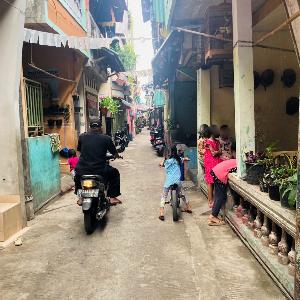Publication on the role of informal social protection in Indonesia
12 Nov 2024
This paper unpacks how informal social protection can complement formal social protection systems, particularly to buffer climate change impacts.
12 Nov 2024
This paper unpacks how informal social protection can complement formal social protection systems, particularly to buffer climate change impacts.

© HER LMU
Gaps in Indonesia’s formal social protection systems persist but informal social structures seem to fill them – at least for the most vulnerable and at small scale
The paper “Indonesia’s social protection system: the relevance of informal social protection to strengthen adaptation to climate change” assesses gaps in Indonesia’s formal social protection system and examines how the most vulnerable fill them.
Social protection is praised as a multipurpose instrument to protect the most vulnerable people and ensure socioeconomic development. However, the high uncertainty of social and economic impacts triggered by climate and environmental change increases pressure on the social protection system, leading to a rising need for deeper and broader coverage, especially among the most vulnerable people.
Over the past few decades, Indonesia, a highly exposed and vulnerable country facing climate change, has increased its efforts to protect all marginalized and vulnerable groups. Nonetheless, this paper finds that formal social protection coverage in Indonesia still has gaps due to unregistered target groups, such as the missing middle population and informal sector workers.
In response to this, vulnerable groups have built their own systems to be socially protected, which is referred to as informal social protection (ISP). Building on empirical evidence from Jakarta, this publication finds that ISP provides vulnerable groups with flexibility, locally specific support, providing mutual benefits and reciprocity. It is characterized by collective decision-making, social cohesion, and trust. ISP can take different forms such as community-based adaptation and be strengthened through support from NGOs. The case of Jakarta furthermore shows how informal social protection structures support vulnerable groups affected by the unintended consequences of adaptation measures implemented by the government.
Overall, the empirical study sheds light on the relevance of informal social protection structures which have received little attention in both, research and policymaking until today. While the example of Jakarta provides valuable insights, more information is needed to better undertsand long-term developments and increased future uncertainties.
Please find the full article here:https://doi.org/10.1080/1943815X.2024.2375995
This article is part of a special issue named World Risk and Adaptation Futures – Addressing Emerging Trends in Climate Change Risks and Adaptation. The collection builds on the “World Risk and Adaptation Futures – Summer Academy” project which was organized by the United Nations University – Institute for Human and Environment Security (UNU-EHS) and Munich Re Foundation (MRF) in coordination with UN Climate Change (UNFCCC) and special partners Ludwig Maximilian University, Munich (LMU), UNU Institute for Natural Resources in Africa (UNU-INRA) and Munich Climate Insurance Initiative (MCII).
The Summer Academy programme had three objectives: a) foster co-creation of decision support at the science-policy-action interface, b) advance the scientific understanding for assessing future exposure and vulnerability trends and c) apply these methods to advance the actionable knowledge. Organized between 2018–2020, this project aimed to specifically address the above raised issues from the following three thematic perspectives: urbanization, demographic change and social protection.
This special issue has compiled scientific approaches and results from these academies with their thematic foci as well as independent work conducted by the participants of the academy. They all contribute to better understanding underlining future trends in climate change adaptation and risks from the three thematic perspectives of the academies.
The special special issue was edited by Himanshu Shekhar (United Nations University Institute for Environment and Human Security (UNU-EHS), Bonn, Germany), Nicholle Koko Warner (UN Migration Global Data Institute (GDI), Berlin, Germany), and Matthias Garschagen (Ludwig-Maximilians-Universität München, Munich, Germany).
The thematic introduction to the Special Issue can be found under:https://doi.org/10.1080/1943815X.2024.2390776